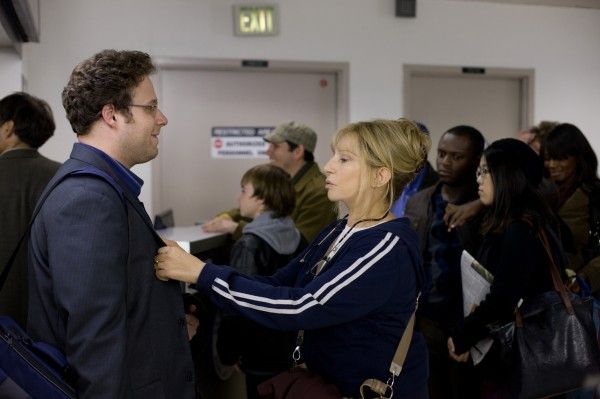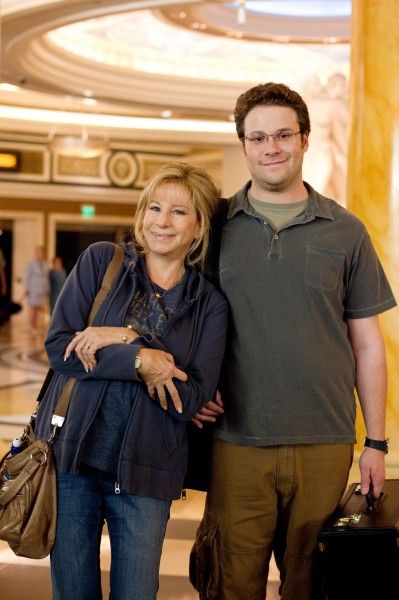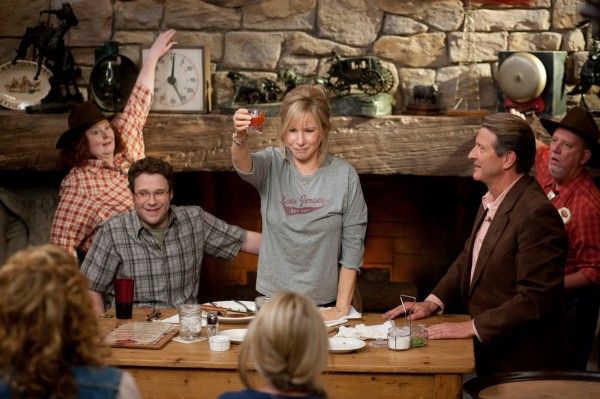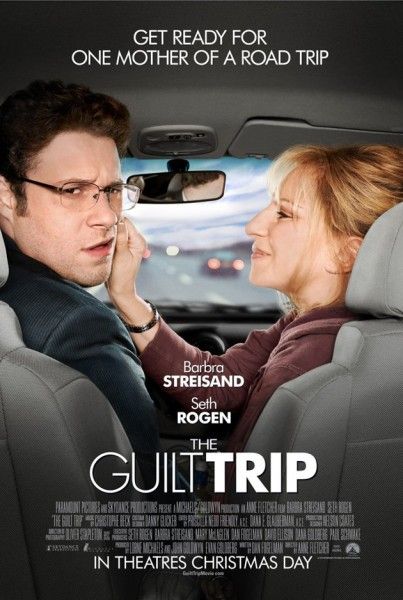This holiday season, you can celebrate family at the movies with The Guilt Trip, which tells the story of Andy Brewster (Seth Rogen), as he embarks on a cross-country road trip with his mother, Joyce (Barbra Streisand), to turn one of his inventions into a success. With both funny and poignant moments on their mother-son adventure, each realizes that they just want the other to be happy.
At the film’s press day, writer/executive producer Dan Fogelman spoke to Collider for this exclusive interview about taking a road trip with his own mom to inspire the script, that Barbra Streisand was his mom’s hero, making sure everything in the film came from a place of love, the scene he was most looking forward to seeing brought to life, why mother-son relationships are rarely explored in film, and how he loves it when actors improvise. He also talked about how cool it is to have Robert DeNiro, Morgan Freeman, Michael Douglas and Kevin Kline make up the cast for Last Vegas, which he wrote with Jon Turteltaub directing, what made Imagine (with Al Pacino, Julianne Moore and Jeremy Renner) the right film for him to make his directorial debut with, how much he’s enjoying the success of the ABC comedy series The Neighbors, which he created, and what interested him in the possibility of writing the 50 Shades of Grey movie (he was on the shortlist). Check out what he had to say after the jump.
Collider: Knowing how much your mom had loved Barbra Streisand, did you suggest her for this role or was her getting cast just a coincidence?
DAN FOGELMAN: Yeah, that’s how it started. Really, this is a small movie about a mother and a son. In some ways, it’s almost a stage play. It’s just two people with not a ton of other characters in the film. When we started saying Barbra and Seth [Rogen], that was when everybody locked in. If we hadn’t gotten both Barbra and Seth, I don’t know if the movie ever would have gotten made. I know that Anne [Fletcher], our director, was very determined, the studio was very determined, and I was very determined. My mom was a Jewish girl from Brooklyn. Once that was even on the radar, I was determined to get it done and make it happen. Barbra was her icon of icons, and hero or heroes. I was really focused on getting this made as a belated love letter to my mom. I could show you pictures of my mom when we took the actual road trip. Everything that happens in the film, happened on that road trip. If you see pictures of my mom at the Grand Canyon next to pictures of Barbra at the Grand Canyon, you would freak out at how much Barbra played her.
During that road trip, did your mom know you were writing it for a movie?
FOGELMAN: Yes, she knew I was writing it for a movie, but she didn’t know about Barbra ‘cause it was still in the early stages. I told my mom I was going to do a movie about a son who hears a story about his mom and takes her on a cross-country road trip, and I wanted to actually take the trip with my mom to see what it would be like to drive cross-country with your mom. And then, I sent emails to a group of my friends and my mom’s friends every night, from every hotel we were at, with an update on what had happened that day ‘cause they all thought I was fucking crazy to be doing this with my mom. That basically became my log of the trip that I then turned into the screenplay.
Was it important to you to make sure that, no matter how upset this mother and son get with each other, it still all comes from a place of love?
FOGELMAN: Yeah, it’s not ugly. I was trying to get the slightly more cinematic version of my relationship with my mom, which I think was a really common relationship. I adored my mom. I thought she was the best. I loved her very much. That was a call for me, even as a 30-some-year-old guy. If something good was happening in my life, I’d call my mom to let her know. If something bad was happening, she’d be somebody whose advice I would seek out. We had a very good relationship, but she drove me crazy, all the time. But, she drove me crazy in a loving way. I couldn’t understand her wiring, all the time. I couldn’t understand how she denied herself pleasure and enjoyment in life. As my career got successful and I wanted to do things for her, she wasn’t able to allow them because she just didn’t work that way. It was always that. It wasn’t necessarily ugly, just complicated.
A lot of times, when mother-son or mother-daughter relationships have been put on screen, they tend to trickle towards ugly, and I don’t find that totally realistic for the wide swath of us and it’s also not that fun to watch. When we took the road trip together, she drove me crazy. We had GPS, but five years ago, it wasn’t what GPS is now. We got lost and she was like, “Stop for directions.” I got frustrated and didn’t want to stop for directors because I thought I could figure it out. She said, “Let’s just stop at this gas station. I have to pee.” She had to pee every five minutes on that trip. She said, “I have to pee, so I’ll ask for directions.” So, I pulled over, she got out, and I was waiting and waiting for her. She got back in the car and I turned back onto the main road and said, “So, which direction are we supposed to go?” She started crying and went, “I forgot to ask for the directions!” I started going, “What?! We just stopped so you could ask for the directions!” And she went, “Now you’re yelling at me!” It was never ugly. It was loving, but frustrated. I think we captured that a lot in the film without it ever getting gross.
Do you think your mom would have actually seen herself in Barbra’s performance?
FOGELMAN: Yes. My mom’s name was Joyce. She wore sweatsuits and hand-me-down t-shirts from my varying jobs, schools and universities. She collected frogs. Her three best friends were named Anita, Gayle and Diana. Her best friend Anita was somebody who she treated like a de facto therapist. When we drove across the country, we listened to the book Middlesex on tape. We went to a steakhouse. It’s as autobiographical as you can get, while still having Barbra play a completely realized character that wasn’t just my mom. So, she wouldn’t have much choice, but to recognize herself. I would not drink bottles of water at my mom’s house because I never knew how long she’d been refilling them from the sink and putting them back in the refrigerator.
They always say, doing what I do for a living, write what you know and then people will respond to it. I luckily had a very charming, lovable mom who I think everybody could see bits and pieces of their mom in. All I had to do was write a character that was like my mom, and it made my life easier. We started doing focus groups and it was the most exciting thing where I’d see people really responding to the movie and really responding to Barbra. Afterwards, you’d have this Benetton ad of people in the front row of your focus group, of all different races, ethnicities and ages, and they were all going, “She’s just like my mom.” And it wasn’t just a group of Jewish ladies saying it. It was a black woman and an Indian man and a Chinese kid. Everybody was seeing the most charming, annoying, funny parts of their own mothers in this character, and that was really exciting.
Was there a scene that you were most looking forward to getting to see brought to life?
FOGELMAN: There’s a scene in the middle of the movie. In the first half of the movie, the construct of was always to find yourself in Seth’s shoes and identify with the young guy at a crossroads in his life, trying to do a nice thing for his mom and being driven crazy. And then, in the second half of the movie, there’s a turn and you start identifying a little bit more with her and understanding her more. The scene that bridges the two, which is a more dramatic, heavy scene between them, in the middle, is one I worked on a lot with Barbra. That was a really exciting night, when Barbra lets loose on Seth. That was exciting for us.
Why do you think it is that mother-son relationships never seem to be explored in film?
FOGELMAN: And not in a loving way, either. Some of my favorite movies have explored the father-son dynamic, in a very loving way. It can be complicated, but at the end, it’s that moment where you’re crying because of that core relationship. Terms of Endearment is probably my number one touchstone movie, of the last 30 or 40 years. I just loved that relationship between Shirley MacLaine and Debra Winger, and the mother-daughter relationship that’s complicated but loving. People seem to be scared of doing that with mothers and sons, for whatever the reason. I don’t know why. Maybe it’s too creepy for people.
Having written something so personal, do you cringe when you hear the actors going off the page and improvising?
FOGELMAN: No, I love it! My first jobs were at Pixar and John Lasseter just doing animation would always allow actors to do that, and then animate to that. It was an early lesson for me that, if you’re lucky enough, as I’ve been in my career thus far, to get really incredible iconic people to do your stuff, you want them to tell your story and you want them to be on page in the important moments, and they usually are. Nobody is out to sabotage an entire script and do an improvisational experiment of a movie, but when they’re feeling something in the moment, let them make it their own. That’s what makes them great actors. Crazy, Stupid, Love I did with Ryan Gosling and [Steve] Carell, who are huge improvisational actors, who are both highly capable, as are Seth and Barbra, of being on-point with the script. Even if they weave from it for a moment, they find their way back into it and it turns out to be your best stuff in the movie. When you meet people at a restaurant and they say, “Oh, you wrote that movie? I love that line,” and it’s a line that you never wrote, you just take credit for it. And if the stuff they added doesn’t work, the director won’t put it in the film. So, I believe in it.
How exciting was it when you heard that the cast of Last Vegas, which you wrote, would be comprised of Robert DeNiro, Morgan Freeman, Michael Douglas and Kevin Kline?
FOGELMAN: It was cool. I wrote that one before The Guilt Trip. We’re towards the end of filming it right now, but I went up to Vegas for the table read, a couple months ago. I was literally sitting at the table with the director (Jon Turteltaub) and the cast, and it was crazy. Sometimes at the table read, people just speak the lines, but they all brought it. You could feel that there was something special in the room. And we all went out to a steak dinner. I was sitting there with all those guys, and it was pretty surreal. I haven’t been able to be there as much on that project, as I was on my last couple of films, but I see the dailies every day and it looks really good.
Had you been thinking about making the leap to your directorial debut for awhile, or could you just not see anyone else directing Imagine?
FOGELMAN: I feel like I’m ready. Between Anne [Fletcher] and Jon Turteltaub, who is a really good director, and John [Requa] and Glenn [Ficarra] on Crazy, Stupid, Love, they all allowed me to be very present and part of the movie. And I’d literally seen animation through, from start to finish, through to the edit bay process. So, I first wanted to be ready for it, and then I wanted it to be the right script and the right size movie. When I wrote this, it was a combination of it being the right project and the right time. I’m excited. We start pretty soon.
Are you nervous about directing Al Pacino, Julianne Moore and Jeremy Renner?
FOGELMAN: No. Pacino is the nicest guy. He’s sweet and gentle, and I’m really excited about the opportunity to work with him. It’s going to be a crazy cool experience. It’s a high degree of difficulty movie, and it’s a more independently budgeted one, so it will be a challenge. But, I think the film has unlimited upside, and that’s always really exciting. It could be really terrible, but I don’t think it will be. It could be everything. The movie has the potential, if I do it right, to do that, and that’s a really exciting, daunting thing.
What inspired you to write it?
FOGELMAN: I saw one of those weird news stories online, a couple of years ago, about this musician named Steve Tilston, who had done an interview with a music magazine in the late ‘60s. They thought he was going to be the next big thing and he said, “I’m terrified of becoming the next big thing, musically, and what that would do to me, with the fame and money and everything.” And then, a couple of years ago – he’s in his 60's now – and he got a knock on his door or a phone call, and they told him, “We just found the letter, from back in 1969, when John Lennon read that interview in a music magazine and wrote you a letter that you never received, until now.” And the letter basically gave him advice and said, “I’d like to help you. You don’t have to let money and fame ruin your life. Here’s my home phone number. Call me.” And he didn’t get it until he was in his 60's. The real guy, in real life, is the nicest guy. He’s made a nice musical living, and he never sold out. But I thought, “What about a guy whose life had gone completely off the rails, as he feared. He sold out musically and abandoned his family, and then gets this letter that could have course-corrected him, all the way back then. And he goes on this redemption quest in his 60's.” That’s the basis of it. Pacino plays the musician.
How are you juggling your ABC comedy series The Neighbors with writing films, and what do you like about the opportunity to write something long-term?
FOGELMAN: It’s all fun. I have a little bit of Attention Deficit Disorder, so I like to keep it fresh and interesting. With the TV show, it’s like you’re directing a gigantic movie. It is a huge undertaking. We’re doing 22 episodes of the show this year, as I was getting The Guilt Trip finished, another movie shot and have been prepping the one I’m going to direct, so I’ve been all over the place. My girlfriend deserves a big vacation with me, at some point, because I never get to see her anymore. But, it’s fun. TV is like doing a play, every week. I’ve been working on The Guilt Trip for five years, Last Vegas for six years and Imagine for four year, and it won’t be seen for awhile. With the TV show, I write an episode and, three weeks later, it’s on TV in front of six million people. That’s an interesting experience, as well.
Is it true that you were on the short list to write the script for 50 Shades of Grey?
FOGELMAN: I think so. It was a little overblown. I had one conversation with the producers about it, and that was it. I liked the challenge of it. I thought it could have been a really cool job. The pitch was basically the scene in Crazy, Stupid, Love where [Ryan] Gosling seduces Emma Stone, with a harder sexual quality, but still a romantic comedy. It’s going to be very hard to execute, but the classy version of that movie could be really huge and interesting.
The Guilt Trip opens in theaters on December 19th.





